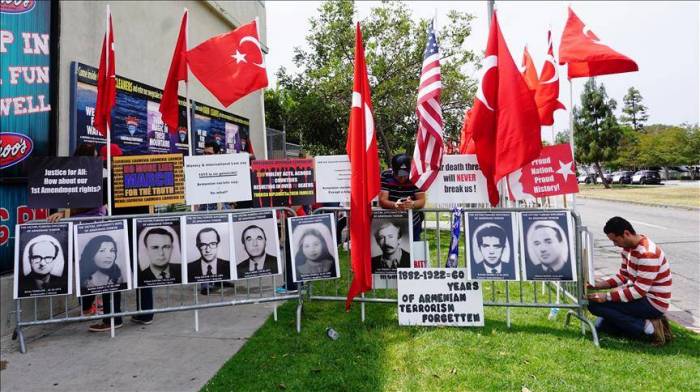His wife, Sevil Ozmen, and his 16-year-old son, Kaan Ozmen, were also seriously injured but managed to survived. The Armenian Secret Army for the Liberation of Armenia (ASALA) claimed responsibility for the 1980 terrorist attack.
Decades later, the hurt still fresh, the wound still open, Turkey is still mourning for Ozmen and his daughter, who were among over 30 Turkish diplomats and their family members martyred by ASALA and similar terror attacks between 1973 and 1984.
Founded in 1975 in Beirut, Lebanon during the Lebanese Civil War, ASALA is responsible for hundreds of bloody terror acts.
According to Armenian Terror -- a 2006 study by Omer Engin Lutem, a former Turkish diplomat -- the killings spanned the continents, taking place in the U.S., Austria, France, Italy, Spain, Lebanon, Greece, Switzerland, the Netherlands, Canada, Portugal, Iran, and the U.K.
The study said that the assimilation of Armenians who migrated to other countries was seen as a threat to Armenian churches and political parties, which then decided to revive extremist national emotions to hinder assimilation and protect their concept of identity.
First killing in 1973
Though the group formed in 1975, the first killing of a diplomat and his deputy came on Jan. 27, 1973 when Gurgen Yanikyan, an Armenian, martyred Turkey's consul general in Los Angeles Mehmet Baydar and his aide Bahadir Demir.
A total of three diplomats were martyred between 1973 and 1978, after which Turkish public servants abroad became targets for Armenian terrorist organizations like ASALA and the so-called Justice Commandoes for Armenian Genocide.
From 1975 to 1984, Turkish ambassadors and diplomats were targeted around the world by ASALA and its affiliates.
These Armenian terrorist attacks intensified from 1980 to 1983, when 580 of the 699 attacks -- over 80 percent -- occurred. The terrorist attacks ended in 1986, according to the Armenian Terror study.
In order to compel the Turkish government "to acknowledge publicly its responsibility for the so-called Armenian genocide in 1915, pay reparations, and cede territory for an ‘Armenian homeland’,” ASALA martyred Turkish diplomats in numerous bloody attacks in that decade.
In 1915, the Ottoman Empire relocated Armenians in eastern Anatolia following revolts when some sided with invading Russians, and there were Armenian casualties during the relocation process.
Armenia has demanded an apology and compensation, while Turkey has officially refuted Armenian allegations over the incidents saying that, although Armenians died during the relocations, many Turks also lost their lives in attacks carried out by Armenian gangs in Anatolia.
The Turkish government has repeatedly called on historians to study Ottoman archives pertaining to the era in order to uncover what actually happened between the Ottoman government and its Armenian citizens.
The debate on so-called “genocide” and the differing opinions between the present-day Turkish government and the Armenian diaspora, along with the current administration in Yerevan, still generates political tension between Turks and Armenians.
Rebuffing the “genocide” allegations, Turkey has officially acknowledged past experiences as a great tragedy in which both parties suffered heavy casualties, including hundreds of Muslim Turks.
Terror acts in Paris
The attack at Esenboga airport on August 7, 1982, was one of the most notorious attacks of ASALA, as the group targeted non-diplomat civilians for the first time.
Nine people died and over 80 were injured when two terrorists opened fire in a crowded passenger waiting area of the airport in the Turkish capital Ankara.
The 1981 and 1983 Paris attacks are among the group's other notable acts. ASALA terrorists held 56 people hostage for 15 hours during Turkish Consulate attack in 1981, while a suitcase bomb killed eight people -- most of them non-Turks -- in 1983 at a Turkish Airlines check-in desk at Paris’ Orly Airport.
According to some Turkish officials, it was the Orly attack when the group lost much of its support and financial backing from the Armenian diaspora and had to dissolve.
Here is a list of Turkish diplomats and public servants martyred by Armenian terrorist attacks:
Jan. 27, 1973 Santa Barbara Consul General Mehmet Baydar
Jan. 27, 1973 Santa Barbara Consul Bahadir Demir
Oct. 22, 1975 Vienna Ambassador Danis Tunaligil
Oct. 24, 1975 Paris Ambassador Ismail Erez
Oct. 24, 1975 Paris Driver Talip Yener
Jan. 16, 1976 Beirut Head Clerk Oktar Cirit
June 9, 1977 Vatican Ambassador Taha Carim
June 2, 1978 Madrid Ambassador's Wife Necla Kuneralp
June 2, 1978 Madrid Retired Ambassador Besir Balcioglu
Oct. 12, 1979 The Hague Ambassador's Son Ahmet Benler
Dec. 22, 1979 Paris Tourism Counselor Yilmaz Colpan
July 31, 1980 Athens Administrative Attache Galip Ozmen
July 31, 1980 Athens Attache's Daughter Neslihan Ozmen
Dec.17, 1980 Sydney Consul General Sarik Ariyak
Dec.17, 1980 Sydney Security Attache Engin Sever
March 4, 1981 Paris Working Attache Resat Morali
March 4, 1981 Paris Religious Officer Tecelli Ari
June 09, 1981 Geneva Contracted Secretary M. Savas Yerguz
Sep. 24, 1981 Paris Security Attache Cemal Ozen
Jan. 28, 1982 Los Angeles Consul General Kemal Arikan
May 05, 1982 Boston Honorary Consul General Orhan Gunduz
June 07, 1982 Lisbon Administrative Attache Erkut Akbay
June 07, 1982 Lisbon Administrative Attache's Wife Nadide Akbay
Aug. 27, 1982 Ottawa Military Attache Colonel Attila Altikat
Sep. 9, 1982 Burgas Administrative Attache Bora Suelkan
March 9, 1983 Belgrade Ambassador Galip Balkar
July 14, 1983 Brussels Administrative Attache Dursun Aksoy
July 27, 1983 Lisbon Undersecretary's Wife Cahide Mihcioglu
April 28, 1984 Tehran Contracted Secretary's Wife Isik Yonder
June 20, 1984 Vienna Working Attache Erdogan Ozen
Nov. 19, 1984 Vienna International Servant Enver Ergun
Anadolu Agency
















































